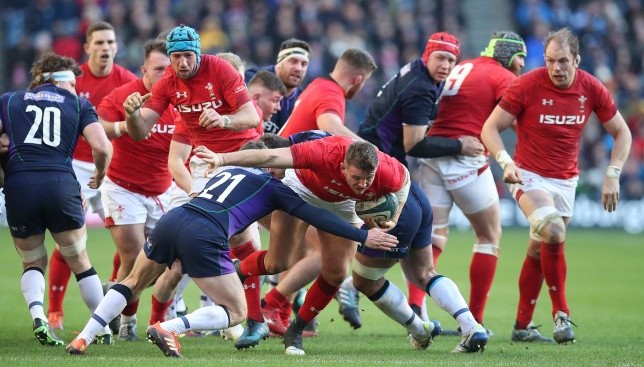
Wales inched closer to a first Grand Slam since 2012 by extending their 100 per cent record at the weekend.
Here, we break down the good and bad points from the weekend’s action.
WALES
Good: It may have been an indifferent performance for Warren Gatland’s side but the Grand Slam dream is firmly on track. Defended well under the pump for much of the second-half and slowed up Scotland ball at every opportunity. Always felt the Dragons had another gear despite being under pressure late on. A class side.
Bad: May be guilty of thinking ahead to their decisive encounter against Ireland next Saturday. Missed a few tackles in the second period and were forced to defend desperately when Scotland were camped in their 22. Star man Liam Williams going off injured is also a worry.
ENGLAND
Good: An incredibly powerful performance. Manu Tuilagi and Joe Cokanasiga impressed as the Red Rose crossed for eight tries in a dominant display. They could pick up a third Six Nations title in four years if Ireland beat Wales in Cardiff next week.
Bad: Hard to find many negatives with their performance considering it was a comprehensive victory.
IRELAND
Good: Ireland controlled everything – the efficiency at the breakdown, tight defence, excellent continuity play, quick line speed and general commitment to the contest. James Ryan, Garry Ringrose and Cian Healy were also sublime. Their superb win over France elevates confidence levels in time to spoil Wales’ grand slam party next weekend.
Bad: If there was one criticism for an overall strong Ireland display, they switched off defensively in the final ten minutes and conceded two tries. The withdrawal of full-back Rob Kearney before kick-off was another slight concern, but he is expected to be fit for next weekend.

FRANCE
Good: The sole positive for Jacques Brunel – besides two late tries – was the performance of Felix Lambey. The 24-year-old Lyon lock made 30 tackles over his 62 minutes on the field, including 22 in the first-half alone.
Bad: Where to start. Their discipline continues to be a disgrace, conceding a staggering 12 penalties over the course of the game. They showed no consistency in their game plan and never looked like being a threat. One of sports biggest enigmas, especially with the immense talent they have in their squad.
SCOTLAND
Good: Though it was another defeat, it was the Scots best performance of the championship so far. There was plenty to admire about the displays of Darcy Graham and Hamish Watson. The latter, in particular, showed a glimmer of his potential when introduced late in the second period, carrying with real vigour and getting them over the gain line.
Bad: Squandered a large chunk of quality positions and could have won the game if they were any way accurate. The Murrayfield defeat followed an error strewn home loss to Ireland and a meek display against France in round three in Paris. The loss of key men to injury has also diminished the team.
ITALY
Good: Their persistence in the match was one of the big positives for Conor O’Shea. They lost three centres to injury and ended up with a prop playing as a backrow at one point. For all their effort they were rewarded with a try by Luca Morisi on 53 minutes. But otherwise it was all England.
Bad: The Azzurri were unable to match the physicality of England, lacked consistency and fell to their 21st successive Six Nations defeat. A loss against France next Saturday looks likely too.